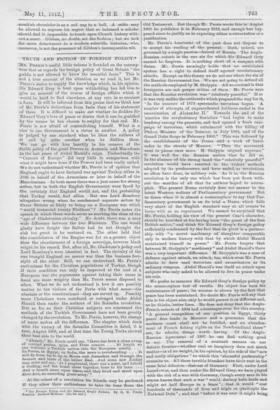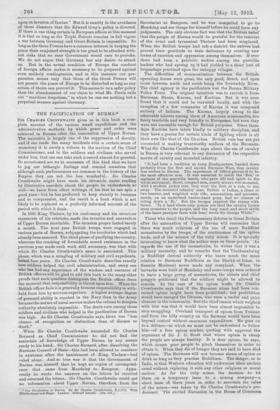TRUTH AND FICTION 131 . FOREIGN POLICY.* .11a. PERMS'S useful little
volume is founded on the assump- tion that as regards the foreign policy of Great Britain " the ,ublie is not allowed to know the essential facts." This is not a true account of the situation as we read it, but Mr. 'Ferris's desire to supply the knowledge which, in his opinion, Sir Edward Grey is bent upon withholding has led him to give an account of the course of foreign affairs which it would be bard to find elsewhere, at any rate in so succinct a form. It will be inferred from this praise that we think less Of Mr. Perris's deductions from facts than of his statement -of them. It is difficult to make out whether he dislikes Sir Edward Grey's love Of peace or denies that it can be gratified 'by the means he has chosen to employ for that end. Mr. Perris is nut afraid of contradicting himself. What is a Nice in one Government is a virtue in another. A policy fie judged by one standard when he likes the authors of it and by quite another when he dislikes them. We can go with him heartily in his censure of the leeble policy of the great Powers in Armenia and Macedonia an the last years of Abdul Hamid's reign. Undoubtedly the ' Concert of Europe " did very little in comparison with what it might have done if the Powers had been really united. We do-not understand whether Mr. 'Perris is of opinion that England ought to have declared war against Turkey either in 3896 in behalf of the Armenians or later in behalf of the Macedonians. In both eases there was a just cause for strong action,' but in both the English Government were faced by the certainty that England would not, and the probability that Turkey would, find allies. But was Lord Rosebery altogether wrong when he condemned separate action by !Great Britain as likely to bring on a European war which
*" would transcend twenty Floddens" P Mr. Perris notes the speech. in which these words occur as marking the close of the age of Gladstonian chivalry." No doubt there was a very wide difference between the two Ministers. The one would gladly have fought the Sultan had he not thought the a'isk too great to be ventured on. The other held that the consolidation of the Empire was for us a greater object than the chastisement of a. foreign sovereign, however black alight be his record. But, after all, Mr. Gladstone's policy and lord Rosebery's were identical in fact. The chivalry of the one brought England no nearer war than the business fore- sight of the other. Still, we can understand Mr. Perris's 'enthusiasm for the Christian populations of Turkey, though if their condition can only be improved at the cost of a European war the arguments against taking their cause in land are more weighty than Mr. Perris seems disposed to allow. What we do not understand is how it can possibly matter to the victims of the Porte with what sauce—the absolute or the constitutional—they are served up. Possibly snore Christians were murdered or outraged under Abdul Harald than under the authors of the Salonika revolution. i3ut so far as their Christian subjects are concerned the methods of the Turkish Government have not been, greatly -changed by the revolution. To Mr. Perris, however, the change of name makes all the difference. The chapter which deals with the victory of the Salonika Committee is dated, it is true, August 1908, and at that time the Young Turks showed their best side to the world.
"Already," Mr. Perris could say, "there.has been a clean sweep of corrupt pashas, spies, and Press censors. . . . At length we can welcome a Turkish nation into the European comity.. . In Persia, in Egypt, in India, the news is.reverberating.. . . It willflyfrom Up to lip in Mecca and Jerusalem and through the bazaars and tents of the hither East. And some new Ezekiel may arise and say, ' As I prophesied, there was a noise, and behold a shaking% and the bones came together, bone to his bone. . And .a breath came Upon thorn, and they lived and stood upon their feet, an exceeding great army."
At the outset-of a revolution its friends may be pardoned if they allow their enthusiasm to take its tone from the * Our Foreign, Patel/ end Sir Edward Grey's k'uilure. G, H. Perria
Louden Andrew Melrose. f2o. 6d. net.]
Old Testament. But though Mr. Perris wrote,this in August 1908 he publishes it in February 1912,•and enough has' hap- pened since to justify us in expecting either a,•retractation or a justification.
Mr. Perris's treatment of -the past 'does not dispose us to accept his reading of the present. Both, indeed, are governed by a single passion—hatred of Russia. The Anglo- Russian entente is the one sin for which Sir Edward- Grdy cannot be forgiven. It is nothing short of a compact with Satan. Mr. Perris seemingly holds that no established system has a right to defend itself • against revolutionary- attacks. Except on this theory we do not see where the in of the Russian Government lies. We are not going to defend all the methods employed by M. Stolypin. Altwe contend is that foreigners are not proper critics of them. Mr. Perris says that the Russian revolution was "relatively peaceful." If so it was very unlike the outbreaks which prepared the way'fOr it, "In the summer of 1878 systematic terrorism began. A number of attempts of unprecedented boldness ended in the assassination of Alexander II." Towards the end of the 'nineties the revolutionary Socialists "had begun to make headway among the peasants, and had opened it fresh cam- paign of terrorism, which culminated with the killing' Of Plehve, Minister of the Interior, in July 1904, and of the Grand Duke Serge in February 1905." This was followed' by the establishment of the Duma and a week of barri- cades in the streets of Moscow. " Then the • movement went to pieces once more, M. Stolypin reigned supreme." It was well for the Russian nation that he did so. In the absence of his strong hand the "relatively peaceful" revolution would have resorted to the -violent methods adopted by its predecessors, and have ended, as revolutions so often have done, in military rule. As it is, the Russian revolution is the only one which has been put down with- out the sacrifice of all that its authors hoped to accom- plish. The present Duma certainly does not answer to the latest Western notions of Parliamentary government. But in times when it is almost a -commonplace to say that Par- liamentary government is on its trial a Duma which falls very short of the English standard may at all events be borne with as an experiment. We cannot be surprised that Mr. Perris, holding his view of the present Czar's character, should be horrified at his having been "•the guest of the free British nation," and think Sir Edward Grey's foreign .policy sufficiently condemned by the fact that its pivot is a partner• ship with "a secret machinery of slaughter comparable' only in modern history with that by which Abdul Humid
maintained himself in power," Mr. Perris forgets that between M. Stolypin's " machinery" and Abdul Hatnid's there was a very important difference. M. Stolypin's was a ease of defence against attack, an attack, too, which even Mr. Perris admits to have used terrorism and assassination as its ordinary weapons. Abdul Hamid's was itself an attack upon subjects who only asked to be allowed to live in peace under his rule.
We prefer to measure Sir Edward Grey's foreign policy by the commonplace test of results. Its object has been the maintenance of peace; its success is shown by the feet that peace has been maintained. No doubt Mr. Perris will say that this is his object also, only he would pursue it on different and, as he thinks, better lines. He does not deny that the Anglo- French entente of 1904 had advantages even for this country. " A general recognition of oar position in Egypt, thirty years' free trade in Morocco and a guarantee that the northern coast shall not be fortified, and an abandon- ment of French fishing rights on the Newfoundland shore" are, he admits, things worth having. -Of the Anglo- Russian Agreement of 1907 be can find nothing good' The removal of a ooustunt menace on our
to say.
frontier—whether real or imaginary does not ranch matter—is of no weight, in his opinion, by the aide of the" new and costly obligations " to which this "shameful partnership" commits us. All these terrible blunders have their root in the same fetal delusion—distrust of Germany: First, under Lord. Lansdowue, and then under. Sir. Edward Grey, we have played with the risk of a war with Germany, though every man in his senses knows that such a war " would destroy both lands and might set half Europe in a Maze "; that it would "cost hundreds of thousands of lives and triple or gratdruple the National Debt" ; and that "before it was over it might bring
upon us invasion of famine." But it is exactly to the avoidance of these disasters that Sir Edward Grey's policy is directed. If there is one thing certain in European affairs at this moment' it is that so long as the Triple Entente remains in full vigour a war between Germany and Great Britain is impossible. So long as the three Powers have a common interest in keeping the peace their conjoined strength is too great to be attacked with- out risks that no sane Government would care to provoke. We do not argue, that Germany has any desire to attack us. But in the actual condition of Europe the conduct of foreign affairs makes it necessary to be prepared against even unlikely contingencies, and in this instance our pre- paration means only that three of the Great Powers will not permit the peace of Europe to be disturbed so long as any action of theirs can prevent it. This seems to us a safer policy than the abandonment of our claim to what Mr. Perris calls our " maritime despotism," in which he can see nothing but a perpetual menace against Germany.











































 Previous page
Previous page